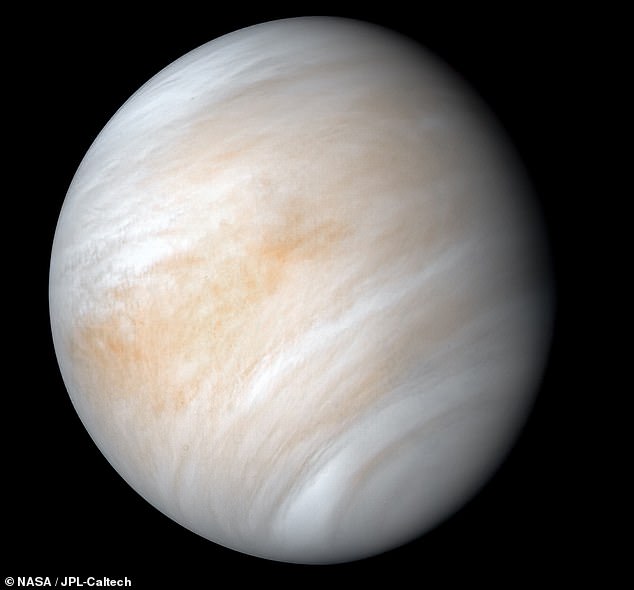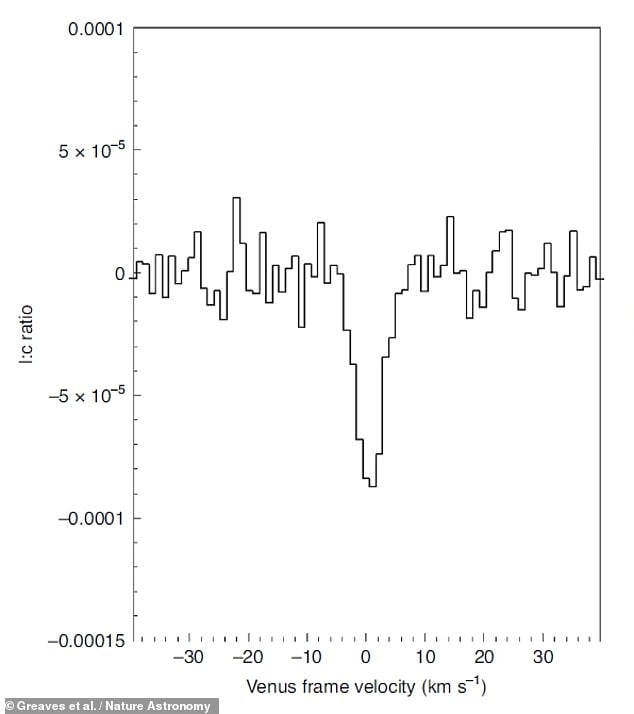Is there life on Venus?
Scientists detect traces of phosphine gas that could be coming from MICROBES in clouds swirling high in the planet’s atmosphere.

Traces of phosphine gas detected in the clouds above Venus could be an indication that the planet supports microbial life, a new study has concluded.
On Earth, phosphine — a colourless gas that smells like garlic, or decaying fish — is naturally produced mainly by certain microorganisms in the absence of oxygen.
It can also be released in small amounts from the breakdown of organic matter, or industrially synthesised in chemical plants.
Experts from the UK, however, found signs of phosphine in Venus’ atmosphere — suggesting the planet must support unknown chemical processes, or even life.
Venus inhospitable
The second-closest planet to the Sun, Venus is inhospitable — with a surface temperature around 867°F (464°C) and pressure 92 times that of on the Earth.
However, its upper cloud deck — 33–38 miles (53–62 kilometres) above the surface — is a more temperate 120°F (50°C), with a pressure equal to that at Earth sea level.
The clouds are also highly acidic — meaning that the phosphine would be broken down very quickly and must therefore be being continually replenished.
The researchers have cautioned, however, that life is only one possible explanation for the source of the phosphine — with further investigation needed.

The new study
In their new study, astronomer Jane Greaves of Wales’ Cardiff University and colleagues observed Venus using both the James Clerk Maxwell Telescope at Hawaii’s Mauna Kea Observatory and the Atacama Large Millimeter/submillimeter Array in Chile.
They detected a so-called spectral signature that is unique to phosphine — and furthermore were able to estimated that the gas is present in Venus’ clouds in an abundance of around 20 parts-per-billion.
The team explored assorted ways that the gas could have been produced in this setting — including from sources on the surface of the planet, micrometeorites, lightning, or chemical processes happening within the clouds themselves.
However, they were unable to determine exactly what is the source of the detected trace quantities of the gas.
The researchers have cautioned that the detection of phosphine is not itself robust evidence for alien microbial life — and only indicates that potentially unknown geological or chemical processes are occurring on the planet.
Further observations and modelling will be needed, they added, to better explore the origin of the gas in the planet’s atmosphere.
‘Phosphine could originate from unknown photochemistry or geochemistry — or, by analogy with biological production of phosphine on Earth, from the presence of life,‘ the research team wrote in their paper.
‘If no known chemical process can explain phosphine within the upper atmosphere of Venus, then it must be produced by a process not previously considered plausible for Venusian conditions,‘ they added.
‘This could be unknown photochemistry or geochemistry — or possibly life.‘
‘Even if confirmed, we emphasise that the detection of phosphine is not robust evidence for life, only for anomalous and unexplained chemistry.‘
More information about extreterrestrial life in our solar system on Nature, DailyMail, Strange Sounds and Steve Quayle.













Venus is a natural oven, a hell, there will be microorganisms in some areas of its atmosphere and among the clouds, but its surface is almost 500 degrees Celsius, 932 degrees Fahrenheit. Everything melts instantly, gases evaporate. Regards.
Be vevwy, verwy, verwy, careful….cause you know who might live in such a verwy verwy hot place!!!
I have also told many years here that we are not alone. There are infinity of planets and stars and each planets has its own sun. Also we have sent sayouz 2 is been gone out of 3 galaxies by now. Shows the planet earth and 8000 languages shows to ET
that were we are?
Read the Books by Immanuel Velikovsky. In Worlds in Collision, he said there was some kind of life on the planet Venus. Many of his statements and hypothesis have been found to be correct. Both in astronomy and in the Earth Sciences.
poppycock. he’s been proven wrong continually